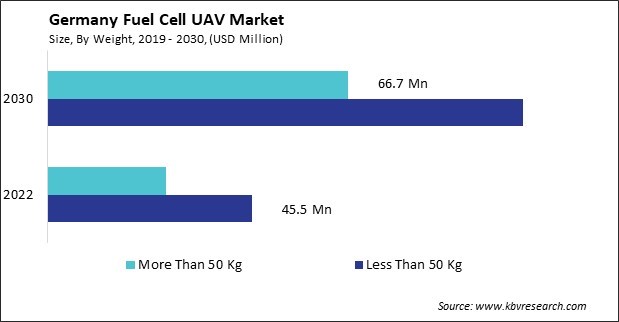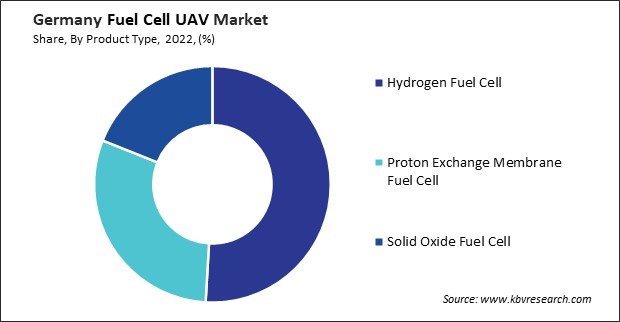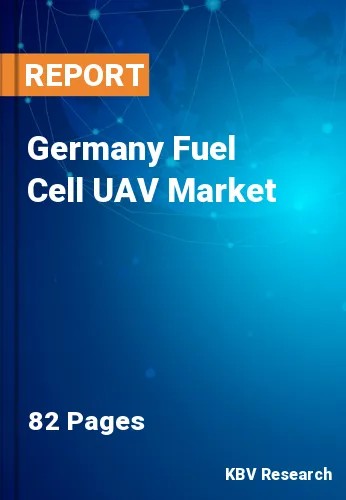The Germany Fuel Cell UAV Market size is expected to reach $172.3 Million by 2030, rising at a market growth of 11.4% CAGR during the forecast period.
The fuel cell UAV market in Germany is experiencing significant growth and innovation, driven by technological advancements, environmental concerns, and the increasing demand for efficient and sustainable aerial solutions across various sectors. Fuel cell technology offers several advantages over traditional combustion engines, making it particularly attractive for UAVs. One key advantage is its high energy efficiency, which allows fuel cell-powered UAVs to achieve longer flight times and ranges compared to battery-powered counterparts.

Moreover, Germany's robust aerospace industry provides a conducive ecosystem for developing and manufacturing fuel cell UAVs. According to the International Trade Administration, in 2019, the German aerospace industry experienced a notable uptick in revenues, reaching EUR 41 billion and reflecting a growth rate of 2.5% compared to the previous year's EUR 40 billion. Established aerospace companies, startups, and research institutions are actively involved in designing, testing, and commercializing fuel cell-powered UAVs tailored to various sectors' diverse needs.
Furthermore, advancements in fuel cell technology, such as improved efficiency, durability, and cost-effectiveness, have made fuel cell UAVs increasingly viable for commercial applications. German manufacturers continuously refine their designs and optimize their systems to enhance performance and reliability, making fuel cell drones more competitive in the industry. Additionally, developing hydrogen infrastructure and refueling stations in Germany has bolstered the adoption of fuel cell-powered vehicles, including UAVs, by providing reliable access to hydrogen fuel.
The COVID-19 pandemic has had a mixed impact on Germany's fuel cell UAV market. The crisis has disrupted supply chains, delayed projects, and slowed investment activities, posing challenges for manufacturers and service providers. Travel restrictions and social distancing measures have also affected field operations and maintenance activities, leading to project delays and revenue losses. However, the pandemic has highlighted the importance of unmanned systems for various applications, such as remote monitoring, delivery, and disinfection, driving demand for fuel cell UAVs in certain sectors.
Germany's aerospace and defense industry has witnessed a significant expansion in the fuel cell UAV market in recent years. According to the International Trade Administration, Germany has Europe's third-largest aerospace and defense industry, with 2022 revenues at EUR 39 billion. Three quarters or USD 30 billion of the German production are exported. Fuel cell technology offers several advantages over traditional propulsion systems for UAVs. These advantages include higher energy efficiency, reduced emissions, and longer endurance. In Germany, where environmental sustainability is a priority, fuel cell UAVs align well with the country's goals for reducing carbon emissions and transitioning towards cleaner energy sources.
One of the key drivers of expanding the fuel cell UAV market in Germany is the strong collaboration between the aerospace and defense industry, research institutions, and government bodies. Collaborative efforts have led to significant advancements in fuel cell technology, including efficiency, power output, and durability, making fuel cell-powered UAVs more viable for various applications.
Furthermore, the defense sector's interest in fuel cell UAVs stems from their potential for various military applications, including reconnaissance, surveillance, intelligence gathering, and even combat missions. In addition to military applications, fuel cell UAVs are gaining traction in civilian sectors such as agriculture, environmental monitoring, infrastructure inspection, and disaster response. Therefore, the symbiotic relationship between the aerospace and defense industry, research, and government has propelled Germany to the forefront of fuel cell UAV development, aligning with environmental goals and diverse application needs.
The adoption of solid oxide fuel cells (SOFCs) in Germany's fuel cell UAV market has been steadily increasing. SOFCs offer several advantages over traditional power sources such as internal combustion engines or batteries. They are highly efficient, with conversion efficiencies reaching up to 60%, significantly higher than those of conventional combustion engines. This efficiency translates into longer flight times and increased range for UAVs, making them more practical for various applications, including surveillance, mapping, and monitoring.
Moreover, SOFCs are environmentally friendly, producing fewer emissions than combustion engines. With Germany's strong commitment to sustainability and reducing greenhouse gas emissions, the adoption of SOFCs aligns well with the country's goals of transitioning towards cleaner energy sources. Additionally, SOFCs operate silently, reducing noise pollution during UAV operations, which is particularly advantageous for missions requiring stealth or minimal disturbance.
Furthermore, the German government has been actively supporting research and development efforts in fuel cell technology, including SOFCs, through funding initiatives and collaborative projects with industry partners and research institutions. This support has accelerated the development and commercialization of SOFCs for UAV applications, making them increasingly accessible to manufacturers and operators in Germany. Hence, the increasing adoption of SOFCs in the German fuel cell UAV market is driven by their efficiency, environmental benefits, silent operation, and strong governmental support for research and development.

In Germany, the fuel cell UAV market is witnessing significant growth and innovation, driven by the country's strong focus on renewable energy and sustainable technologies. One prominent player in the German fuel cell UAV market is H2FLY GmbH. H2FLY is a pioneer in hydrogen-powered aviation, specializing in developing fuel cell systems for aircraft, including UAVs. The company's expertise lies in designing lightweight and efficient fuel cell powertrains that enable long-endurance flights with zero emissions. H2FLY's fuel cell UAVs offer advantages such as extended range, rapid refueling, and reduced environmental impact, making them ideal for aerial mapping, surveillance, and environmental monitoring applications.
Another significant contributor to the German fuel cell UAV market is Skye Intelligence Technologies GmbH. Skye Intelligence focuses on developing autonomous aerial platforms powered by advanced propulsion systems, including fuel cells. The company's fuel cell-powered UAVs are designed for various missions, including infrastructure inspection, precision agriculture, and disaster response. Skye Intelligence emphasizes reliability, efficiency, and sustainability in its UAV designs, positioning itself as a leading provider of next-generation aerial solutions in Germany.
Hydrogenius Technologies GmbH is also crucial in advancing fuel cell technology for UAVs in Germany. The company specializes in hydrogen storage and distribution solutions, focusing on enabling clean and efficient transportation. Hydrogenius Technologies collaborates with UAV manufacturers to integrate hydrogen fuel cell systems into their aerial platforms, offering benefits such as extended flight endurance and rapid refueling capabilities. The company's contributions to the German fuel cell UAV market drive innovation and expand the possibilities for hydrogen-powered aerial operations.
Moreover, Microdrones GmbH is leveraging fuel cell technology to enhance the performance and capabilities of its unmanned aerial systems. Microdrones develops professional UAV solutions for surveying, mapping, and inspection applications catering to construction, mining, and agriculture industries. By integrating fuel cell powertrains into its UAV platforms, Microdrones aims to provide customers with longer flight times, increased payload capacity, and enhanced operational flexibility, contributing to fuel cell UAV technology advancement in Germany.
Furthermore, Intelligent Energy Germany GmbH, a subsidiary of Intelligent Energy Holdings plc, is actively involved in developing and commercializing fuel cell systems for UAVs. The company specializes in compact, lightweight fuel cell solutions with high energy density and fast refueling capabilities. Intelligent Energy's fuel cell technology enables UAVs to achieve extended flight durations and reduced operational costs, making it a valuable asset in the German fuel cell UAV market. As advancements in fuel cell technology continue, the industry for fuel cell-powered UAVs is expected to expand, offering new opportunities for growth and innovation in the aerospace sector.
By Weight
By Product Type
By Application
By Type
By End-Use
Our team of dedicated experts can provide you with attractive expansion opportunities for your business.

